虚拟语气课件(公开课)subjective_mood
虚拟语气公开课全PPT课件

04
虚拟语气的实际应用
在写作中的应用
写作中,虚拟语气可以用来表达假设 、条件、建议、意愿等,使句子更加 生动、有力。例如,“如果我是你, 我会选择这个选项。”
在翻译中的应用
在翻译过程中,虚拟语气可以用来保持原文的语气和情感色彩,使译文更加准确、传神。例如,在翻 译英文的虚拟语气时,可以将其翻译为中文的“要是”、“如果”、“假如”等词,以保持原文的语 气和含义。
虚拟语气在翻译中还可以用来处理一些难以理解的句子或表达方式,使其更加符合目标语言的习惯和 表达方式。例如,在翻译一些复杂的从句或长句时,可以使用虚拟语气来简化句式或突出重点。
虚拟语气公开课全ppt 课件
汇报人:可编辑
2023-12-23
目录 CONTENT
• 虚拟语气概述 • 虚拟语气的基本形式 • 虚拟语气的特殊形式 • 虚拟语气的实际应用 • 虚拟语气常见错误与纠正方法 • 虚拟语气练习与答案解析
01
虚拟语气概述
定义与特点
定义
虚拟语气是表示假设、想象、推 测等非真实情况的语气,常常用 于条件句、祝愿、建议等语境中 。
虚拟语气常见错误与纠 正方法
时态错误
总结词
时态错误是指虚拟语气在时态使用上的不准确,通常表现为混淆了虚拟语气与陈述语气 。
详细描述
在英语中,虚拟语气通常表示与事实相反的情况,如假设、想象、祝愿等,时态的使用 应与事实相反。例如,在"If I were you, I would do it"中,"were"和"would"构成了 虚拟语气,表示与事实相反的情况。如果混淆了虚拟语气和陈述语气,就会造成时态错
unit 1 subjunctive mood ppt
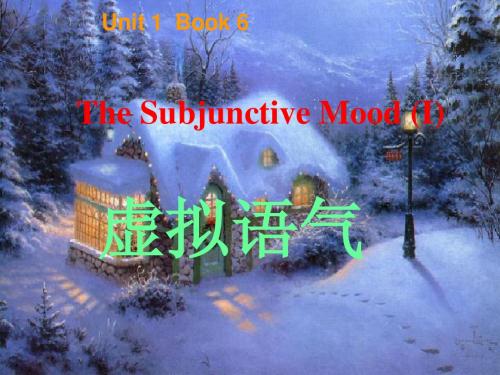
c. If I _______ (meet) you yesterday, had met we would have gone (go) to the ______________ concert together.
Situation three:
If he got up early,
he would be on time.
I wish I were as tall as YaoMing.
表示对现在情况的虚拟: 表示对现在情况的虚拟:从句动 现在情况的虚拟 词常用“过去时(were)”。 词常用“过去时 。
I wish every day were my birthday.
表示对过去情况的虚拟: 表示对过去情况的虚拟:从句动 过去情况的虚拟 词常用“ 词常用“had+过去分词”。 +过去分词” I wish/wished I hadn’t eaten so much watermelon.
I wish it would rain tomorrow.
表示对将来情况的虚拟: 表示对将来情况的虚拟:从句动词常用 将来情况的虚拟 “would/could/might should+V.(原)”。 原 。
二、虚拟语气特殊句型: 虚拟语气特殊句型
现在: 过去时(were) 1. wish 现在 过去时 过去: 过去完成时(had done) 的宾语 过去 过去完成时
Unit 1 Book 6
The Subjunctive Mood (I)
虚拟语气
A GUESSING GAME!
Our aims:
Today we are going to learn: 1.When to use the subjunctive 1.When mood? 2. Three sentence structures. 3.虚拟语气在条件状语从句中的用 3.虚拟语气在条件状语从句中的用 法
虚拟语气subjectivemood.ppt
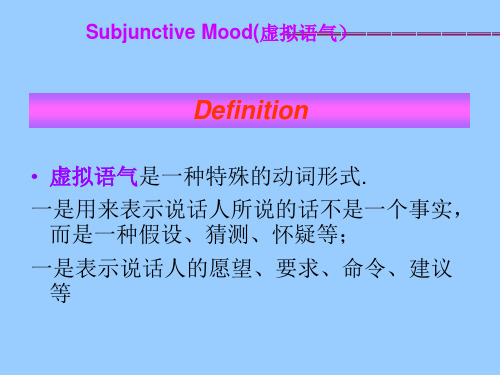
3. If I were you, I would go at once. 假如我是你的话,我会马上走。(与现在事实相反, 事实上我不可能是你)
虚拟语气 If型特例1:混杂条件句:
定义:从句与主句的动作发生的时间不同
If they had studied hard, they could do it easily now.
He suggested that we (should) go home earlier. 宾语从句
It was suggested that we (should) go home earlier. 主语从句
His suggestion was that we (should) go home earlier. 表语从句
+从句
未来: would/could/might +V.(原)
[例句]
虚拟语气 类似 if 型
1. I wish I were 30 years younger.
2. I wish (that) you would get a good job.
3. He wished he hadn‘t done it.
Wish / As if (though) Would rather/ If only
But for +n/ Without +n
It’s (high) time +that
类似 if 型(1)
Wish/
现在: 过去时(were)
As if / (though) 过去: 过去完成时(had done)
T
虚拟语气
Should + V 型
英语语法PPT之虚拟语气Subjunctive mood
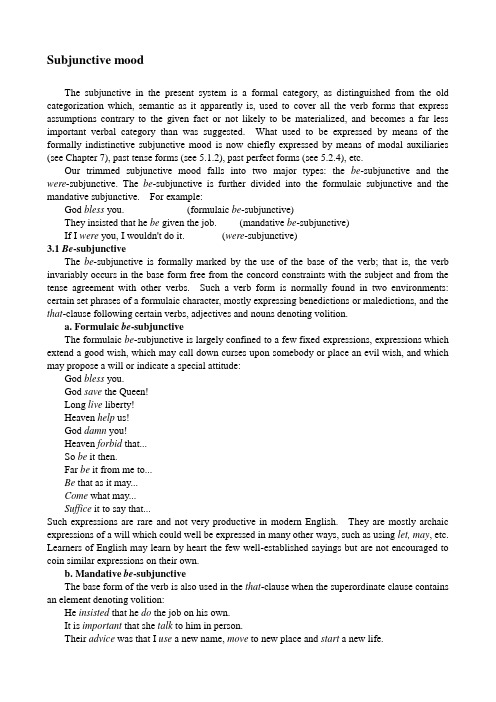
Subjunctive moodThe subjunctive in the present system is a formal category, as d istinguished from the old categorization which, semantic as it apparently is, used to cover all the verb forms that express assumptions contrary to the given fact or not likely to be materialized, and becomes a far less important verbal category than was suggested. What used to be expressed by means of the formally indistinctive subjunctive mood is now chiefly expressed by means of modal auxiliaries (see Chapter 7), past tense forms (see 5.1.2), past perfect forms (see 5.2.4), etc.Our trimmed subjunctive mood falls into two major types: the be-subjunctive and the were-subjunctive. The be-subjunctive is further divided into the formulaic subjunctive and the mandative subjunctive. For example:God bless you. (formulaic be-subjunctive)They insisted that he be given the job. (mandative be-subjunctive)If I were you, I wouldn't do it. (were-subjunctive)3.1 Be-subjunctiveThe be-subjunctive is formally marked by the use of the base of the verb; that is, the verb invariably occurs in the base form free from the concord constraints with the subject and from the tense agreement with other verbs. Such a verb form is normally found in two environments: certain set phrases of a formulaic character, mostly expressing benedictions or maledictions, and the that-clause following certain verbs, adjectives and nouns denoting volition.a. Formulaic be-subjunctiveThe formulaic be-subjunctive is largely confined to a few fixed expressions, expressions which extend a good wish, which may call down curses upon somebody or place an evil wish, and which may propose a will or indicate a special attitude:God bless you.God save the Queen!Long live liberty!Heaven help us!God damn you!Heaven forbid that...So be it then.Far be it from me to...Be that as it may...Come what may...Suffice it to say that...Such expressions are rare and not very productive in modern English. They are mostly archaic expressions of a will which could well be expressed in many other ways, such as using let, may, etc. Learners of English may learn by heart the few well-established sayings but are not encouraged to coin similar expressions on their own.b. Mandative be-subjunctiveThe base form of the verb is also used in the that-clause when the superordinate clause contains an element denoting volition:He insisted that he do the job on his own.It is important that she talk to him in person.Their advice was that I use a new name, move to new place and start a new life.The following is a list of such elements which commonly introduce a that-clause containing the mandative subjunctive:V erbs: advise, ask, command, decide, demand, desire, insist, move, order, prefer,propose, recommend, request, require, suggest, urge, etc.Adjectives:advisable, desirable, essential, fitting, imperative, important, necessary, etc. Nouns:advice, command, decision, decree, demand, motion, order, proposal,recommendation, request, requirement, resolution, suggestion, etc.The mandative be-subjunctive is more common in American English than in British English, where it is often replaced by should+infinitive as an alternative. Also, the mandative be-subjunctive is preferred in formal English while in a less formal context it can be replaced by other verb forms in spite of the condemnation in textbooks for being non-standard.c. Other uses of be-subjunctiveThe be-subjunctive is also found, especially in formal English, in an adverbial clause of condition, concession, etc. typically introduced by if, though (although, even though), whatever, whether, lest, etc.:If he be found guilty, he will be punished.If he be elected chairman, we shall all resign.Though he be reduced to poverty, he will never be dishonest.I shall follow him even though he slay me.Whatever be your reason for that, we shall not tolerate your dishonesty.Whether he confess or not, he shall face the severest punishment.The movie star is wearing sunglasses lest he be recognized.Home is home, be it ever so homely.Immediate actions must be taken if need be.In such contexts, the more usual verb forms are the simple present tense and may/should+infinitive, except for the last two which are formulaic in nature.3.2 Were-subjunctiveThe were-subjunctive is the smallest grammatical category because it has only one form—were. It is used with all subjects regardless of their person distinctions, thus formally contrasting with the indicative forms of be.The subjunctive were is usually found in subordinate clauses expressing hypothesis (in which case was could often be used as an informal alternative if possible):If she were here now, he wouldn't be that rude.If only she were here.If he were to arrive now, he'd still be too late for the interview.He speaks as if he were the boss here.I wish he were here with us.Suppose he were to fail.Note that in more fixed expressions, the were-subjunctive is generally preferred or probably obligatory:If I were you, I wouldn't tell her the news.He is my best friend—my second self, as it were.Also note that were, not was, can be used to introduce a conditional clause with inverted word order:Were it to rain tomorrow, the opening ceremony would have to be postponed.Were he to arrive now, he'd still be late for the interview.。
subjunctive mood PPT教学课件

2020/12/10
14
2.在错综时间条件句中,虚拟 条件句和主句动作发生的时间 不一致,因此,主句和从句的 谓语动词要根据各自所指的不 同时间选用适当的虚拟语气形 式。
the successful launching of the spacecraft would have been impossible.
A) Were there to be
B) If there were
C) Had there been
D) Would there have been
2020/12/10
如果需要的话,我可以辞职。
Had you informed me earlier, I wouldn't have signed the contract.
要是你早些告诉我的话,我是不 会签那份合同的。
2020/12/10
11
Let’s do it together:
C 5.______the smallest mistake,
If you _h_a_d__c_o_m__e__yesterday, you _w_o_u__ld__h_a_v_e__s_e_e_n_ him.
2. I can’t meet you tomorrow, because I
have to work.
If I _d_i_d_n_'t__h_a_v_e__ to work, I
Subjunctive-Mood虚拟语气高三PPT课件
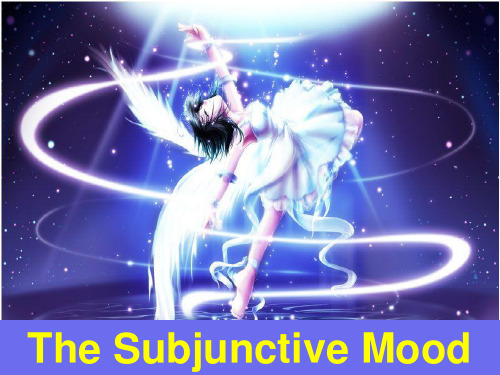
-
4
Correct the mistakes.
1. If you had taken my advice, you would not
make such a mistake. have made
2. If you didn’t invite me, I shouldn’t have
come to the party. hadn’t invited
(be动词通常用were)
+ 动词原形
我要是你就拒绝这些钱 If I were you, I might refuse the money.
如果我是小鸟,就可在天空飞翔。
If I were a bird, I could fly in the sky.
如果我拥有一间大屋就开心了。
If I owned a big house, I would be very happy.
如果我是你,我就努力学习英语。
If I were you, I would study English hard.
(I can’t be you.)
-
3
1.表示和过去事实相反
had+过去分词
would/could/might have + 过去分词
如果司机没有开那么快,事故就不会发生了。
If the driver hadn’t driven so fast, the accident wouldn’t have happened.
要是我英语考及格,那就开心了。
If I pass the English exam, I will be very happy.
要是今天不用上课,我就去购物。虚拟条件句。
If we had no class today, I would go shopping.
虚拟语气公开课全PPT动画课件

虚拟语气的实例分析:以具体文学作品为例,分析虚拟语气在其中的运用和表达效果
虚拟语气的注意事项:避免混淆、注意语境、注意语气和语调等
06
虚拟语气在汉语中的应与分类:解释虚拟语气的概念,并介绍其在汉语中的分类,如与现在事实相反、与过去事实相反、与将来事实可能相反等。
虚拟语气在汉语中的实例分析
虚拟语气的基本形式:与现在相反、与过去相反、与将来相反
虚拟语气在汉语中的实际案例分析:以具体文学作品或新闻报道为例,分析虚拟语气的使用
虚拟语气在汉语中的特殊情况:与英语虚拟语气的区别、特殊表达方式等
虚拟语气在汉语中的应用场景:文学、新闻、广告、日常交流等
07
总结和回顾
总结虚拟语气的要点和难点
虚拟语气的定义和用法
虚拟语气的常见句型和表达方式
虚拟语气与真实语气的区别和联系
虚拟语气的形式和变化规则
回顾本次公开课的内容和重点
虚拟语气的用法和注意事项
虚拟语气的定义和用法
虚拟语气的形式和分类
虚拟语气与真实语气的区别和联系
汇报人:
感谢观看
虚拟语气公开课全PPT课件
目录
01
添加目录标题
02
虚拟语气的定义和分类
03
虚拟语气的构成和用法
04
虚拟语气的特殊用法和注意事项
05
虚拟语气在英语中的应用和实例分析
06
虚拟语气在汉语中的应用和实例分析
07
总结和回顾
01
添加章节标题
02
虚拟语气的定义和分类
虚拟语气的定义
定义:虚拟语气是一种表达者故意虚构的语气,通常用于表达与实际情况相反的情况或假设。
添加标题
分类:虚拟语气可以分为基本虚拟语气和特殊虚拟语气两种。基本虚拟语气用于表达与实际情况相反的情况或假设,而特殊虚拟语气则用于表达更加具体或特殊的情况或假设。
虚拟语气(Subjective Mood)

2、表示与过去事实相反的情况 if+主语+had done +其他 +主语 +should/would/could/might+have done+其他 例: 1. If I had got there earlier, I should/could have met her. 如果我早到那儿,我就会见到她。 (事实:去晚了) 2.If he had taken my advice, he would not have made such a mistake. 如果他听我的劝告的 话,就不会犯这样的错误了。 (事实:没有听我的话)
2、用法及动词形式
1、表示与现在事实相反的情况: if+主语+过去时+其他 主语+should/would/could/might+do+其他
1.If I were you, I would take an umbrella.如果我是你, 我会带把伞。(事实:我不可能是你) 2.If I knew his telephone number, I would tell you. 如 果我知道他的电话号码,我就会告诉你。(事实:不知道) 3.If there were no air or water, there would be no living things on the earth. 如果没有水和空气,地球上 就不会有生物。(事实:地球上既有空气也有水) 4.If I had any money with me, I could lend you some. 如果我带钱了,我就会借给你些。(事实:没带钱) 5.If he studied harder, he might pass the exam.如果 他再努力些,就能通过考试了。(事实:学习不用功)
虚拟语气课件(公开课)subjective_mood

TIPS
虚拟语气
insist / suggest 各有两种意思,要用不同的语气 Insist 表示“坚决要求”时,用虚拟形式,即 should + do; Insist 表示“坚持认为,坚持说”时,用陈述语气,表示事 实。 Suggest 表示“建议”时,用虚拟形式。 Suggest 表示“表明、暗示”时,用陈述语气。
If型特例1:混杂条件句:
定义:从句与主句的动作发生的时间不同
If they had studied hard, they could do it easily now.
与过去相反
虚拟语气
If型特例2:省略 if 的条件从句:
用法:从句中有 were, had 或 should 时, 省略if ,而把它们放在句首。 1. If I were you, I would not do that. Were I you, I would not do that. 2. If he should fail in the experiment this time, he would try again. Should he fail in the experiment this time, he would try again. 3. If you had not helped me,I should have failed. Had you not helped me, I should have failed.
It’s time that we should go to
bed.
虚拟语气 类似 if 型(5)
一些短语相当于虚拟条件从句(if…), 其后的句子与虚拟条件主句用法一致。
but for +n(要不是),
新虚拟语气公开课subjective_mood
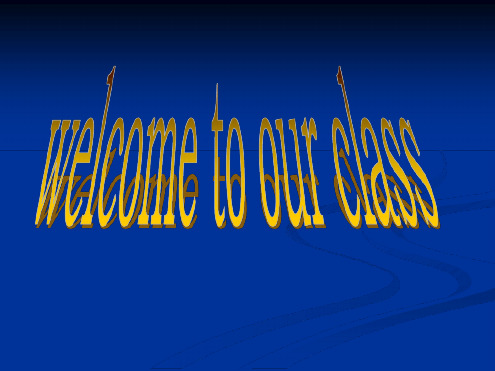
1.If you had told me in advance, I _____ him at the airport.
A. would meet B. would had met C. would have met D. would have meet
总结:从句中有 were, had 或 should 时,
省略if ,而把它们放在句首 。
______I you, I would go with him to the
party.
A. Was
B. Had been
C. Will be
D. Were
Had you listened to the doctor,you
要是你早来几分钟的话,你就能见到他了。 (与过 去事实相反 )
2. If it were sunny tomorrow, I would come to see you.
明天要是天气好的话,我来看你。 (与将来事实可 能相反 )
3. If I were you, I would go at once. 假如我是你的话,我会马上走。 (与现在事实相反 ,事实上我不可能是你 )
虚拟语气
Should +v 型
1.在宾语从句,表语从句,同位语从句,主语从句中。 这种用法的常用词有:
一个坚持 两个命令 三个建议 四个要求
insist order, command advise, suggest, propose demand, require, request, ask
表示说话人的 愿望、要求、 命令、建议等
虚拟语气
Types
虚拟语气ppt

虚拟语气
虚拟语气表两种意义
1.表命令、要求、建议、猜想或意图。
2.表“非真实的动作” ,说话者知道这个动作不会发生, 认为这个动作仅仅是一种主观愿望或假想。
虚拟语气的表现形式——谓语
含义
命令、 要求、 建议、 猜想或 意图
形式 v.(原形) should+v. should have done
虚拟范围 现在、过去、将来 现在 过去
复合句的虚拟
主语从句 1 it is necessary(important,
imperative, essential, urgent, advisable, desirable, vital)that…以 及 it is suggested (proposed, required, demanded, requested, recommended, decided,agreed, determined, arranged) that... 2 it is possible(likely, probable) that... 前面肯定句时
He insisted that Jennie send her to dancing school. 他坚持要珍妮送她上舞蹈学校。
I ordered that the gate should be locked. 我嘱咐把门锁好。
(二)在表愿望的宾语从句中 (主句动词用wish,从属连词that常省略)。 1.使用一般过去时或过去进行时(表现在) 2.过去完成时或would / could+have +过去分词(表过去), 3.would/could +动词原形(表将来) I wish I got more letters. 我希望我收到更多的信。(表现在) I wish I wasn't going to Bristol. 我真希望不是去布里斯托尔。(表将来) She wished she hadn't said it. 她真希望她没有说过这话。(表过去)
虚拟语气讲解课件

虚拟语气
虚拟语气在复合句中的应用:
三、错综时间的条件句
即从句与主句的动作发生的时间不同。此时,需要 按时间来确定虚拟形式。如:
I would rather she hadn't done that.(过去)
我宁愿她没做过那事。
虚拟语气
虚拟语气在 在主语从句中
在句型 “It is important (necessary, strange, natural) that .... ” 中,that 后面的从句中的谓语 动词用: should + 动词原形
[例句] 1. It’s necessary that we should have a walk now.
我们有必要出去散散步。 2. It’s natural that she should do so.
她这样做是很自然的。 3. It’s important that we should take good care of
• Do you know the order that you (should) keep watch.
虚拟语气
虚拟语气在 在 as if 从句中
在as if 从句中,常用虚拟形式,即表示与现在事实 相反,用过去式;与过去事实相反用过去完成式 (had done).
一、as if 连接表语从句 she looked as if she were made of ice. 她看起来似乎是冰做的 he looked as if he hadn’t slept for two days.
虚拟语气课subjective_mood

• 如果上天能够给我一个再来一次的机会, 我会对那个女孩说三个字:我爱你。如果 非要在这份爱上加一个期限,我希望是一 万年。 • If the God should/ were to give/ _____________(give) me gave would tell another chance, I ___________(tell) the girl three words: I love you. If our love ________(have to) be set a time limit, I had to wish it ________be 10000 years. would
Practice: tell what the following people are thinking.
• 2-year-old: • If I ____(can) talk, I ____tell my mother that I hate peas. • 14-year-old: • I ____be happier if I _____(can) drive. • 19-year-old: • If I_____ (have) a lot of money I _____attend a private school.
If the parents ______at the hospital earlier after the accident, the child would have been saved.
A. arrives C. had arrived
B. arrive D. has arrived
虚拟语气
T. or F.
You pale face suggests that you (should) be ill. F
虚拟语气(subjective-mood)

him?
2021/4/9
A. are ,going to ask
22
B. do , ask
学习虚拟条件句还要注意以下4点:
(1)省略if 部分倒装 若虚拟条件句中有 were, had, should 时,可省略 if 而将 were, had, should 移到句首。如:
(1)If I were to meet him tomorrow, I should ask him about it.
2021/4/9
34
1. He is not a pilot, but he wishes he__w_e_r_e _ (be).
2. I wish I ____ha_d__m_e_t __(meet)him yesterday.
3. I wish it __w_o_u_ld__be___(be) fine tomorrow.
5
If 引导的条件状语从句 表示与事实 条件从句的 情况相反 谓语形式
主句的谓语形 式
表示现在情 况
过去式(did) (be常用
were)
would / could /
might / should (用于第1人称) +动词原形(do)
2021/4/9
6
表示过去 过去完成式 上面4个情态动
情况
(had +done 词+have done
visit some of my friends .
2. A. am will go B. were , would go
3. C. shall be D. be , must go
4. 2. If my lawyer ___ here last Saturday, hAe __ me
- 1、下载文档前请自行甄别文档内容的完整性,平台不提供额外的编辑、内容补充、找答案等附加服务。
- 2、"仅部分预览"的文档,不可在线预览部分如存在完整性等问题,可反馈申请退款(可完整预览的文档不适用该条件!)。
- 3、如文档侵犯您的权益,请联系客服反馈,我们会尽快为您处理(人工客服工作时间:9:00-18:30)。
虚拟语气
If 型
[例句] 1. If you had come a few minutes earlier, you would have met him. 要是你早来几分钟的话,你就能见到他了。(与过 去事实相反) 2. If it were sunny tomorrow, I would come to see you. 明天要是天气好的话,我来看你。(与将来事实可 能相反) 3. If I were you, I would go at once. 假如我是你的话,我会马上走。(与现在事实相反, 事实上我不可能是你)
If型特例1:混杂条件句:
定义:从句与主句的动作发生的时间不同
If they had studied hard, they could do it easily now.
与过去相反
虚拟语气
If型特例2:省略 if 的条件从句:
用法:从句中有 were, had 或 should 时, 省略if ,而把它们放在句首。 1. If I were you, I would not do that. Were I you, I would not do that. 2. If he should fail in the experiment this time, he would try again. Should he failed in the experiment this time, he would try again. 3. If you had not helped me,I should have failed. Had you not helped me, I should have failed.
Subjunctive Mood(虚拟语气)
Definition
• 虚拟语气是一种特殊的动词形式. 一是用来表示说话人所说的话不是一个事实, 而是一种假设、猜测、怀疑等; 一是表示说话人的愿望、要求、命令、建议 等
虚拟语气
Types
虚拟语气
1. If 型
条件 If 从句的谓语形 从句 式 现在
虚拟语气 类似 if 型
[例句]
1. I wish I were 30 years younger. 2. I wish (that) you would get a good job. 3. He wished he hadn‘t done it. 4. He treats the little girl as if she were he own daughter.
D you at 2. If I knew you were coming, I ___ the airport. A. had met B. met C. would meet D. would have met
B to my parents! (But I didn’t.) 3. If only I ___ A. listened B. had listened C. should listen D. would listen
T F T
虚拟语气
Should + V 型
2. It is important (necessary, strange,) that .... 类似用法的词有:necessary,strange,natural,
desired, a pity, wonder 。。。
a shame,
no
虚拟语气
Should + V 型
如果没有空气,就不会有生物
3. Thanks to the brave young man, otherwise, the would have died boy ______________(die).
If 型
。。。 。。。
混杂条件句(各自为准)
Were, had ,should提前,省略if
。。。
in that case,
虚拟语气 类似 if 型
1. But for your help, we would not have made (make) such rapid progress.
没有你的帮助,我们是不会取得这么快的进展的。
2. Without air, there _________ would be (be) no living things.
Translation
• It’s necessary that we should have a walk . 我们有必要出去散散步。 • It’s natural that she should do so. 她这样做是很自然的。 • It’s important that we should take good care of the patient. • 重要的是我们要照顾好病人。
do you like better?
Chinese movies VS Western movies
Why Western movies are far more attractive than Chinese films ?
1.If we had started making films earlier, we would … excellent history … have made more films. 2.If there were more good plays and money, … money … we might produce more hot films. … language … 3.If one day Chinese were to become an international language, our films would win a larger audience. ----Subjunctive Mood(虚拟语气)
T. or F.
You pale face suggests that you (should) be ill. F
Your pale face suggests that you are ill. I insisted that you ( should) be wrong. I insisted that you were wrong.
主句的谓语形式 would/could/should/ might +V. (原) would/could/should/ might +have done
过去式 (were) had done
过去
1.过去式 would/could/should 未来 2. should+ V.(原) /might +V. (原) 3. were to do
你该走了。
It’s high time that you went.
It’s high time that you should go.
我们该去
睡觉了。
It’s time that we went to bed.
It’s time that we should go to
bed.
虚拟语气 类似 if 型(4)
If the parents ______at the hospital earlier after the accident, the child would have been saved.
A. arrives C. had arrived
B. arrive D. has arrived
虚拟语气
虚拟语气
3.类似 if 型
Wish / As if (though) Would rather/ If only
But for +n/ Without +n It’s (high) time +that
类似 if 型(1)
Wish/ As if / (though) +从句
现在: 过去时(were) 过去: 过去完成时(had done) 未来: would/could/might +V.(原)
1.Would,could,should,might+v
类似if型
3. It is (high) time that…
2.would,could,should,might +have done
虚拟语气
Exercises
A the party if he had gone to 1. Alan ___ London. A. would have missed B. had missed C. would miss D. missed
虚拟语气
2. Should + V 型 在宾语从句,表语从句,同位语从句 及主语从句中 句型 it is necessary/strange/…that +从句
虚拟语气
Should +v 型
1.在宾语从句,表语从句,同位语从句,主语从句中。 这种用法的词有: 一个坚持 两个命令 三个建议 四个要求
A the house. 4. Tom suggested that Ann ___ A. sell B. sold C. shall sell D. would sell
B to the university. • 5. I wish this bus ___ A. go B. went C. has gone D. had gone
虚拟语气 类似 if 型(2)
过去时 would Rather + that (从句) 宁愿。。。 If only + 要是。。。 过去完成时 过去时 过去完成时
现在/将来 过去
现在
过去
类似 if 型(3)
It’s (high) time +that
